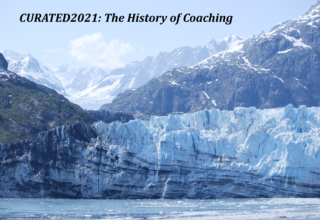
As part of the focus in Curated 2021 on the history of coaching, William Bergquist interviews a prominant professional coach, Agnes Mura, about the events in her life that led her to become a coach and that inform the way in which she engages in the coaching process. Here is the intervew.
Here are some of the themes and insights that emerged from this interview with Agnes Mura:
- Agnes Mura comes to her work as an executive coach with an unusually multi-faceted background in cross-cultural transitions and relationships. To ground herself while moving between cultures, she lived, worked and led groups in a spiritually based network of communities for 20 years. Many of those lived principles and visceral experiences dovetail impeccably and serve her well in her coach approach clients (without being made explicit to her clients).
- Illustrating spirit in action, she tells of helping to prepare a meal in a large communal kitchen. There was considerable tension in the kitchen among those preparing the meal, until someone declared that the food being prepared was therefore too toxic to serve… and threw the chili out the window. That centered the team to find a gentler way of working together in preparing the meal. When asked if she ever invites her clients to “throw out the toxic food”, Agnes indicated that she does invite this kind of bold tone-setting both by leaders and by individual team members, which shifts the atmosphere for everyone.
- Vance Caesar played an important role in helping Agnes become a coach. He first served as her career coach (while she was deciding how to move on from international banking). Agnes decided that the kind of work Vance Caesar was doing would align the many strands of her education, business experience, values and dreams. Vance became a mentor to Agnes and, together with other consultants in Los Angeles, they founded the Professional Coaches and Mentors Association, a 17-year learning community for practitioners of organizational coaching.
- Agnes was born behind the Iron Curtain and exhibited courage and resilience in her establishment of a new life away from Communist rule, in different countries and on two continents. She emphasizes the well-honed (survival?) skill of reading people and environments with genuine curiosity, and an interest in providing what’s missing, for example by helping build and lead coaching organizations at a time when the profession was newly defining itself.
- Agnes’s mother (www.Dusi Mura.com) was a renowned piano professor with a broad and deep artistic horizon. She continued to hold master classes into her 90s in California. Agnes cherishes this legacy of teaching and mentoring – in her work with leaders, if not artists.
- The polarity management perspective is crucial in how Agnes processes the world, for example dancing between control and flexibility, rights and responsibilities, homogeneity and diversity etc. With that tool, she helps leaders and team create and steward their climate as a container of safety, engagement and creativity, without losing their edge for action. This reminded Bill of the polarity in the feminist perspective offered by Riane Eisler, distinguishing the “chalice” (creating a holding environment) and the “blade” (creating a more proactive environment). The act of throwing out the toxic food exemplified an engagement of the blade, on behalf of establishing a chalice in the kitchen that was nurturing rather than toxic.
1K Club

















